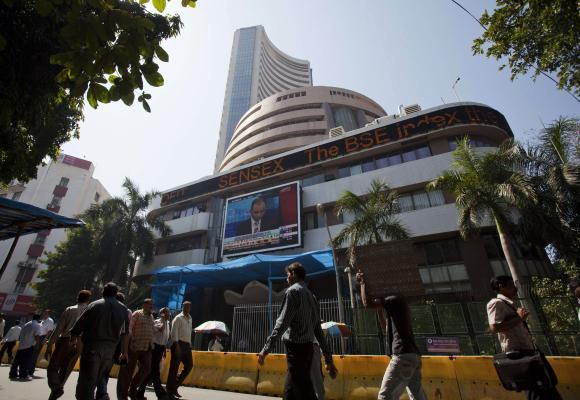 | « Back to article | Print this article |
Sensex slips for 3rd day, drops 57 points at close
The benchmark S&P BSE Sensex fell for the third day and closed 56.57 points lower at 19,748.19, dragged down by metal, realty and bank stocks ahead of the RBI's policy review next week.
Weak first-quarter results from Hindustan Unilever (HUL) and Sterlite Industries also affected market sentiment. HUL, which posted a 23 per cent drop in profit, contributed to half of the decline in the Sensex, which remains at a two-week low.
The Sensex has lost 401.66 points, or 2 per cent, in the past week, during which the RBI came out with fresh curbs on gold imports and a second round of measures to tighten liquidity in a bid to contain exchange rate volatility.
Brokers said investors refrained from creating major positions before the RBI's credit policy review scheduled on July 30. They also said the RBI's liquidity-tightening measures might hurt growth prospects in the short term.
"Markets ended weak on Friday on subdued global cues and continuing concerns over interest rates and rupee," said Dipen Shah, Head of Private Client Group Research at Kotak Securities. "Below-expectation results from a few companies
also marred sentiment. After the steps taken to restrict the rupee depreciation, markets are concerned about any further increase in interest rates."
The Sensex opened higher at 19,892.42 points and climbed to 19,907.45 in early trade following overnight gains in the US market. However, it declined to 19,699.76 before ending at 19,748.19, a loss of 56.57 points or 0.29 per cent.
The 50-share Nifty index on the National Stock Exchange fell 21.30 points, or 0.36 per cent, to 5,886.20. The SX40 index on the MCX-SX, fell 0.32 per cent.
Foreign institutional investors pulled out a net Rs 442.94 crore yesterday, according to provisional BSE data.
The S&P BSE Metal index fell 3.52 per cent, followed by realty, PSU and banking sector indices. Hindalco tanked over 7.5 per cent on heavy selling.
Asian stocks ended mixed. Indices in China, Japan, and Taiwan declined by 0.17 per cent to 2.97 per cent, while indices in Hong Kong, Singapore and South Korea moved up by 0.01 per cent to 0.31 per cent.
